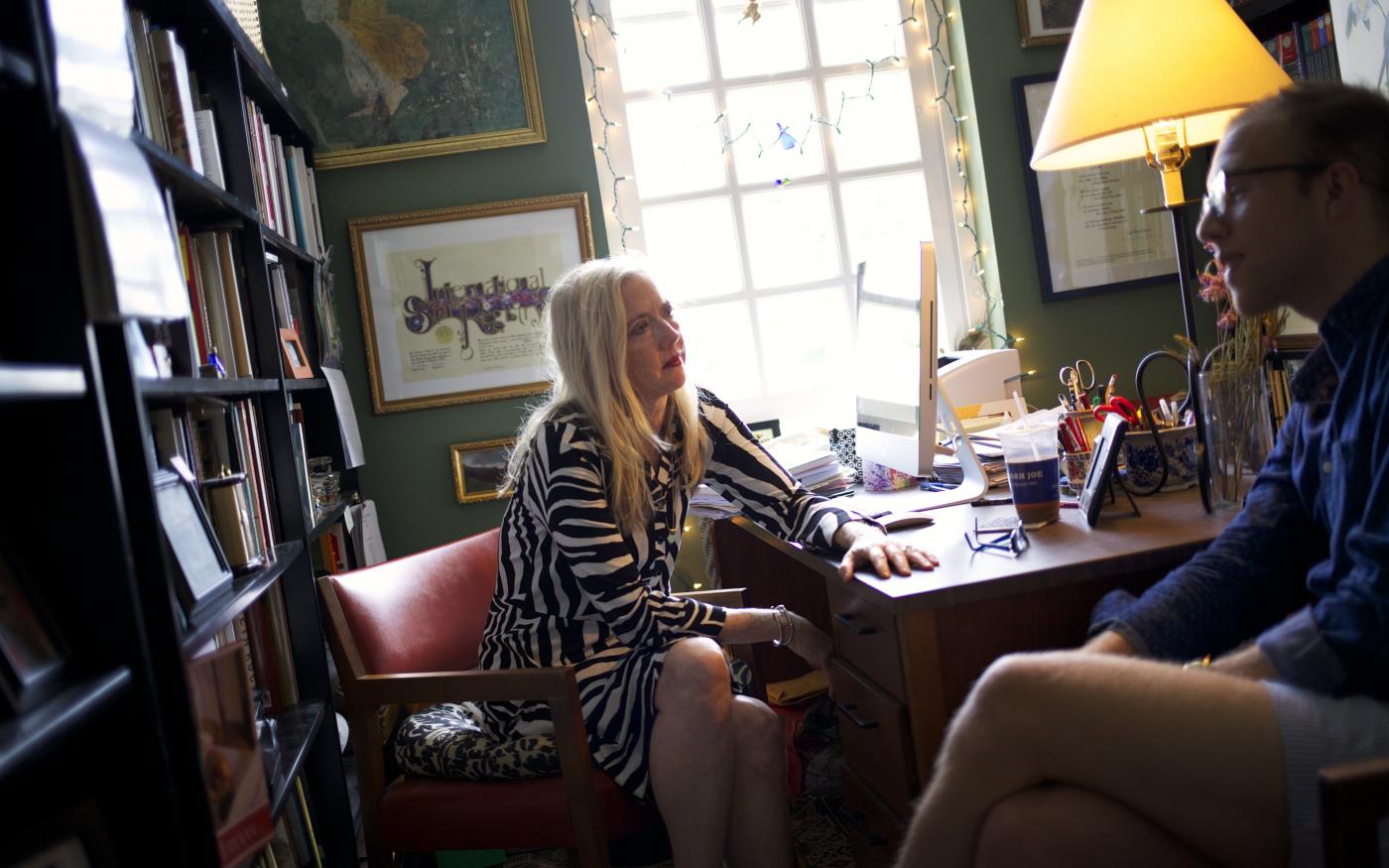This is an excerpt of a longer article from the College of Arts & Sciences website. For the full article, click here.
Kaaleb Adera’s first semester at the University of Virginia was a daily blur of transitions. The aspiring biology major from Fredericksburg took on an ambitious course load that fall three years ago.
Among the classes he picked was “Myths of Adolescence & Literary Imagination,” and that voluntary, one-credit seminar may have done more to help Adera chart his course, in and out of the classroom, than any other.
Poetry professor Lisa Russ Spaar’s College Advising Seminar, or COLA, on the literary explorations of adolescence did not persuade Adera to change paths and become an English major. But because the College of Arts & Sciences faculty members who teach COLAs also serve as academic advisers for the students in those classes, Adera was able to develop a quick comfort level with a prominent professor in a seminar designed for 18 first-year students.
In Spaar, he found a faculty mentor to help him learn how to juggle the study demands of that fall class schedule along with the social learning curve of dorm life and necessary chores such as figuring out the difference between Alderman and Clemons libraries.
“Almost from the beginning, I felt comfortable with Professor Spaar,” said Adera, a fourth-year biology major preparing to apply to dental school. “She gave me some suggestions on other English classes and wrote me a recommendation for a medical/dental internship program this summer at Case Western Reserve University.
“As a faculty member, she’s made it comfortable for me to come to her with any issues I may be having. She’s been a good resource.”
Other universities offer college-advising seminars to incoming students, but those typically focus exclusively on study skills and other issues related to acclimating to college. Within U.Va.’s College of Arts & Sciences, however, incoming first-year students are encouraged – but not required – to select a COLA seminar on an academic topic that interests them.
The College launched the COLA program in 2005. Faculty recognized a need to offer students an opportunity to develop stronger connections with their advisers before selecting majors.
“When we started the program, we were looking for ways to improve advising,” said Rachel Most, the College’s director of advising and associate dean for academic programs. “We wanted to create a format in which students would have regular contact with their faculty advisers, and so the idea was suggested to create a one-credit class that was primarily academic in content, but that also would cover a lot of advising-related issues for the College.
“That way, when it came time to meet with their adviser, they’d already been in the classroom with them for eight weeks and it wasn’t a situation where they were walking into a faculty member’s office for the first time and the faculty member’s asking, ‘What’s your name?’ The faculty know the students better, the students know the faculty better and the advising is much more effective.”
COLA instructors set aside about 20 percent of their weekly class time for advising topics such as the add/drop process for classes, the different review sources available to help pick future courses, the various study-abroad options available and other topics unrelated to the seminar. The remaining 80 percent of the content is academic.
The College has doubled the number of voluntary COLA seminars offered almost every fall semester. The program opened with eight seminars, each of them limited to 18 students, in its first year. This fall, the incoming first-year students were able to select from 60 different COLAs, the largest number offered yet.
COLA seminar topics reflect the broad spectrum of academic specialties of the faculty members offering them, all designed to pique the interest of first-year students who are encouraged, but not required, to take them. This fall’s topics range from Edgar Allan Poe to a “From Stone Tools to Cell Phones” survey of key human developments. One COLA promises to explore what pop culture’s fascination with zombie apocalypses tells us about contemporary political and social life (“Zombies. Political?”).
The Parents Program’s financial contributions to the program, last academic year and this year, have funded 10 COLA classes per term. A permanent endowment, established with a gift by the Souder family, allows for the sponsorship of one seminar a year, as selected by the Office of the Dean. This fall, the 18 first-years who sign up for the Souder Family College Advising Seminar – “The 21st Century Labor Force” – will be taught and advised by U.Va. President Teresa Sullivan.
“The COLA program is a proven success that we are now expanding so we can allow more students to experience this unique blending of academics and advising,” Sullivan said. “Our commitment to growing the COLA program aligns with the priorities in the University’s Cornerstone Plan, which include strengthening U.Va.’s distinctive residential-learning culture, improving advising and delivering new levels of student engagement.”
Since the COLA program’s launch, it has attracted a growing cadre of the College’s top faculty, professors who typically teach upper-level classes that ordinarily would limit their interaction with first- and second-year students.
As director of the English Department’s Area Program in Poetry Writing, Spaar was among the senior faculty members who supported the COLA model as a new way to strengthen the advising experience, for first-years as well as professors.
“Having started teaching in 1980 as a TA in the Graduate School, I’ve had many years to watch first-year students, and I feel it’s really important for us as faculty to know who they are and what ways we can meet them where they are in terms of their interests and the ways they learn, the way they use language,” she said. “It’s something that I want to stay in touch with, and it’s something that I feel like I have to do if I want to continue to teach young people.”
Media Contact
Article Information
August 26, 2014
/content/uva-first-year-students-and-faculty-advisers-build-deeper-bond-over-cola

